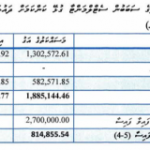President Gayoom has recently stated that 2007 should be the time when all political parties in the Maldives unite to form a new pluralist consensus on the future of the country.
Gayoom expressed his wish in an end-of-the-year letter to world leaders and influential stakeholders in post-tsunami recovery and democratic reform.
He also said he was confident that the legal framework and mechanisms of the first liberal democracy in the Maldives would be completed sometime during 2007.
Speaking to the government, Gayoom went on to say that it should “redouble its efforts to ensure a peaceful transition to a modern, liberal democracyâ€.
But the President’s critics say they have heard Gayoom deliver unfulfilled promises to the international community many times in the past and fear that his latest message is no different.
Regardless of one’s political affiliation, it would be difficult to disagree that the Maldives is currently more democratic than at any other time in its recent history.
Many may also agree with the President that 2006 has been “a year of change, progress and recovery for the Maldivesâ€, but some believe not nearly enough has been done.
In his letter, Gayoom noted his “Roadmap†for reform agenda, which he regarded as a success. He pointed out that the People’s Majlis has concluded all debates on all chapters of the new constitution and said the country remained well on track to conclude its work within the timelines set out in the Roadmap and meet its ultimate goal of multi-party elections in 2008.
But where Gayoom sees success many others, especially those belonging to the Maldivian Democratic Party (MDP) see failure.
Speaking of the government’s Roadmap, MDP Chairperson Mohamed Nasheed (Anni) said his party was not accepting it because the goals that it listed were not being accomplished on time.
“President Gayoom has failed to implement the goals set in is own Roadmap,†said Anni. “Governments in other countries also draw roadmaps, however, the difference is that they implement the goals set in the roadmaps on time.â€
Anni also said: “on 15 May, after Gayoom’s freedom of assembly decree, we saw the Roadmap fail in the first instance. More people were arrested a that time than at any other point in his repressive rule.â€
He continued: “Gayoom has lost his façade. He’s been exposed. He never had any intention of reforming. He tried to spin, through glossy brochures and sneaky boys (those ‘New Maldives’ ministers), that reform was going on. Events have deviated too far from the Roadmap.â€
Spin or not, 2006 has seen the Maldives enter numerous international organisations that promote human rights and democracy. Last year, the country joined the ICCPR (International Covenant on Civil and Political Rights), the ICESCR (International Covenant on Economic, Social and Cultural Rights) and became the 12th country to ratify OPCAT (Optional Protocol to the Convention against Torture).
Gayoom assures that the Maldives’ enrolment in these groups will play a meaningful role in creating a credible international mechanism to promote human rights.
In the conclusion of his letter, the President said that much more remains to be done to repair and reconstruct properties damaged by the tsunami. He noted, however, that a great deal had already been achieved in getting lives and livelihoods back to normal and that the country continues to be on course to attaining the Millennium Development Goals.





